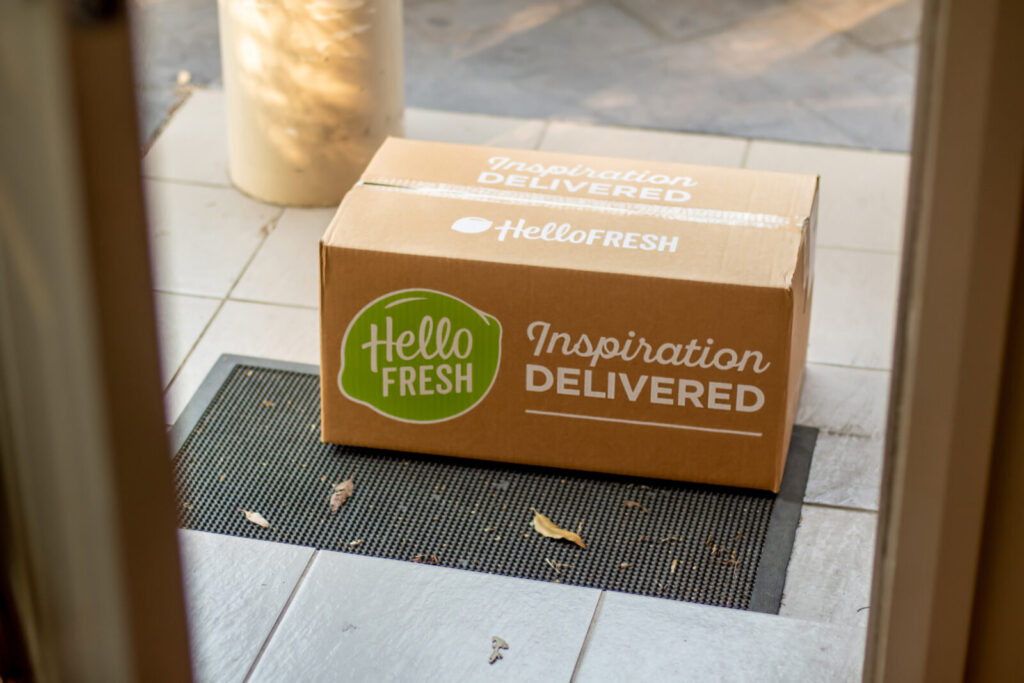Brief • 4 min Read
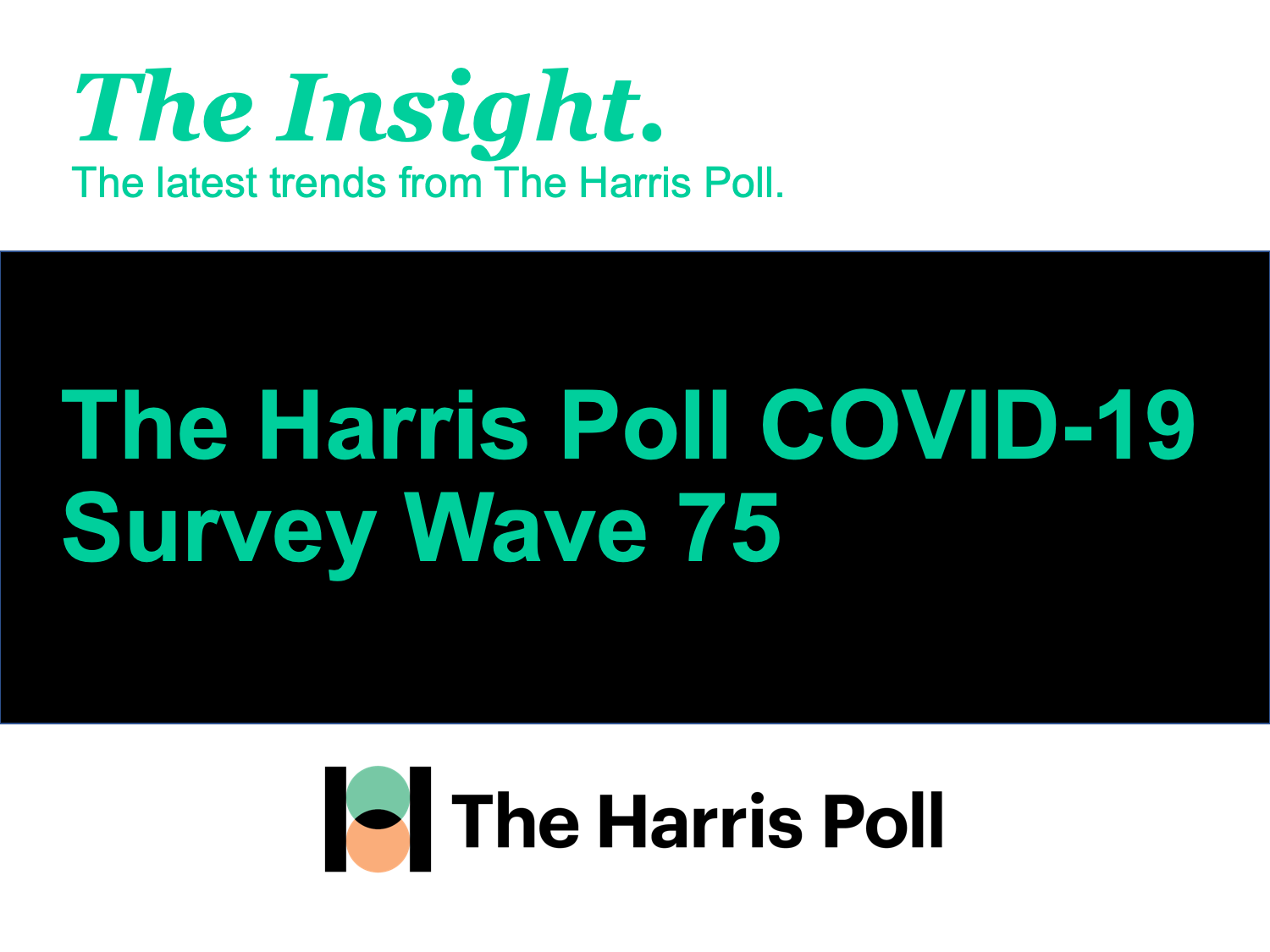
In The Harris Poll Tracker (Week 75) fielded July 30th to August 1st, 2021 among 2,026 U.S. adults, we look at how fear is on the rise in America, the tech setbacks of digital vaccine passports, the journey towards financial freedom, what’s catching hiring decision-makers’ eyes in applicants, and Olympic viewership and brand value.
As a public service, our team has curated key insights to help leaders navigate COVID-19. Full survey results, tables, and weekly summaries can be accessed for free at The Harris Poll COVID-19 Portal. We will continue to actively field on a regular cadence to track the shifts in sentiment and behaviors as the news and guidelines evolve.
Fear Returns
Fear is on the continued rise in America. In our latest survey we found that the rising numbers in fear may be more than just a blip in the radar. Here’s a deeper look:
- As Delta variant cases of COVID continue to surge, it is now one of Americans’ top fears with three-quarters (76%) saying they are very or somewhat concerned about the strain.
- Other fear factors: Three quarters (76%) of Americans say they fear a new wave of COVID, (+8-pts) from just last week, while (65%) say they fear returning to public activity (+4-pts).
- Fear of dying: Nearly half (48%) of Americans fear they could die if they contracted COVID, but just a mere (14%) of those who say they will not wear a mask again indoors say the same.
- But, Americans are fearful of more than just the pandemic: (81%) report being very or somewhat concerned about inflation. Other top concerns include mass shootings (80%) as well as potential future COVID variants (77%).
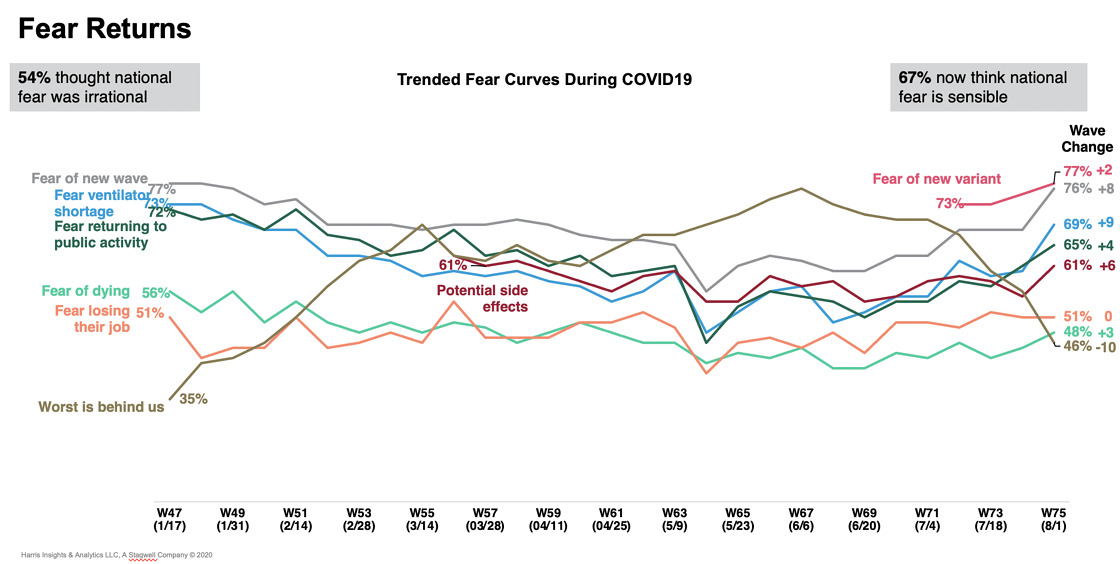
Takeaway: Fear was subsiding among Americans as the rollout of the vaccine progressed, but as the unvaccinated continue to dig their heels in against inoculation we see optimism fading to fear comparable to that of the height of the pandemic.
Americans Are Afraid Their Vaccine Passports Could Get Hacked: Anomali-Harris Poll
Getting Americans to adopt digital vaccine proof has been slow and, according to our survey in partnership with Anomali, the threat of a cybersecurity attack is not helping. See the full results of our survey in the Global Health Pandemic and Cybersecurity Challenge report. Fast Company writes more:
- Although (93%) of Americans have a smartphone capable of supporting a digital vaccination card, only two-thirds (68%) say they are likely to get the card.
- Cybersecurity concerns: A majority (80%) of Americans express some cybersecurity concern regarding digital vaccine cards, with (51%) saying identity theft is top of mind.
- The opponent: One-third of Americans (36%) say they think nation-state cyber actors are likely to be the culprit for a cyberattack.
- Who’s responsible? In the event of an actual cyberattack, (63%) of Ameircans say the government should be responsible for defending digital vaccine verification card users, while only (27%) say it should be the consumers themselves.
- New Yorkers will need to get their vaccine passports ready: the city announced yesterday proof of vaccination will be required before dining indoors or going to the gym.
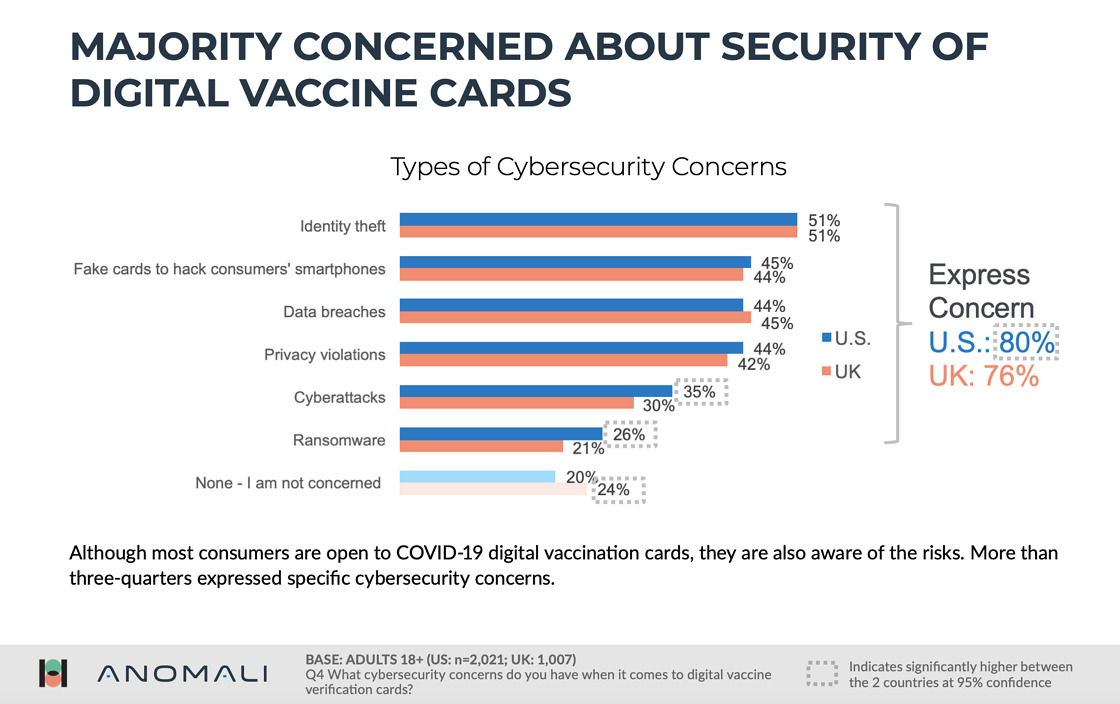
Takeaway: For COVID digital vaccine cards to be successful, the public and private sectors will have to collaborate to develop, deploy, manage, and secure them – especially because only (48%) of Americans think government and private businesses are prepared to defend consumers against potential cyberattacks.
The Journey Toward Financial Freedom: Personal Capital-Harris Poll
The pandemic changed a lot of things for Americans, including work, family life, and more. Our new study with Personal Capital shows that it also made many reconsider their personal finances. The Harris Poll-Personal Capital Journey Toward Financial Freedom report can be found here. Our friends at CNBC write more:
- Half (51%) of Americans say that having an emergency fund is now a higher financial priority than it was pre-COVID.
- Nearly four in ten (39%) of Americans said they were spending less on non-essential items, including (46%) of Gen Zers, (48%) of Millennials, and (47%) of Gen Xers.
- In addition, (37%) said they found that post-pandemic, they can be happy spending less than they’re used to and (35%) said they can live off less than they previously thought.
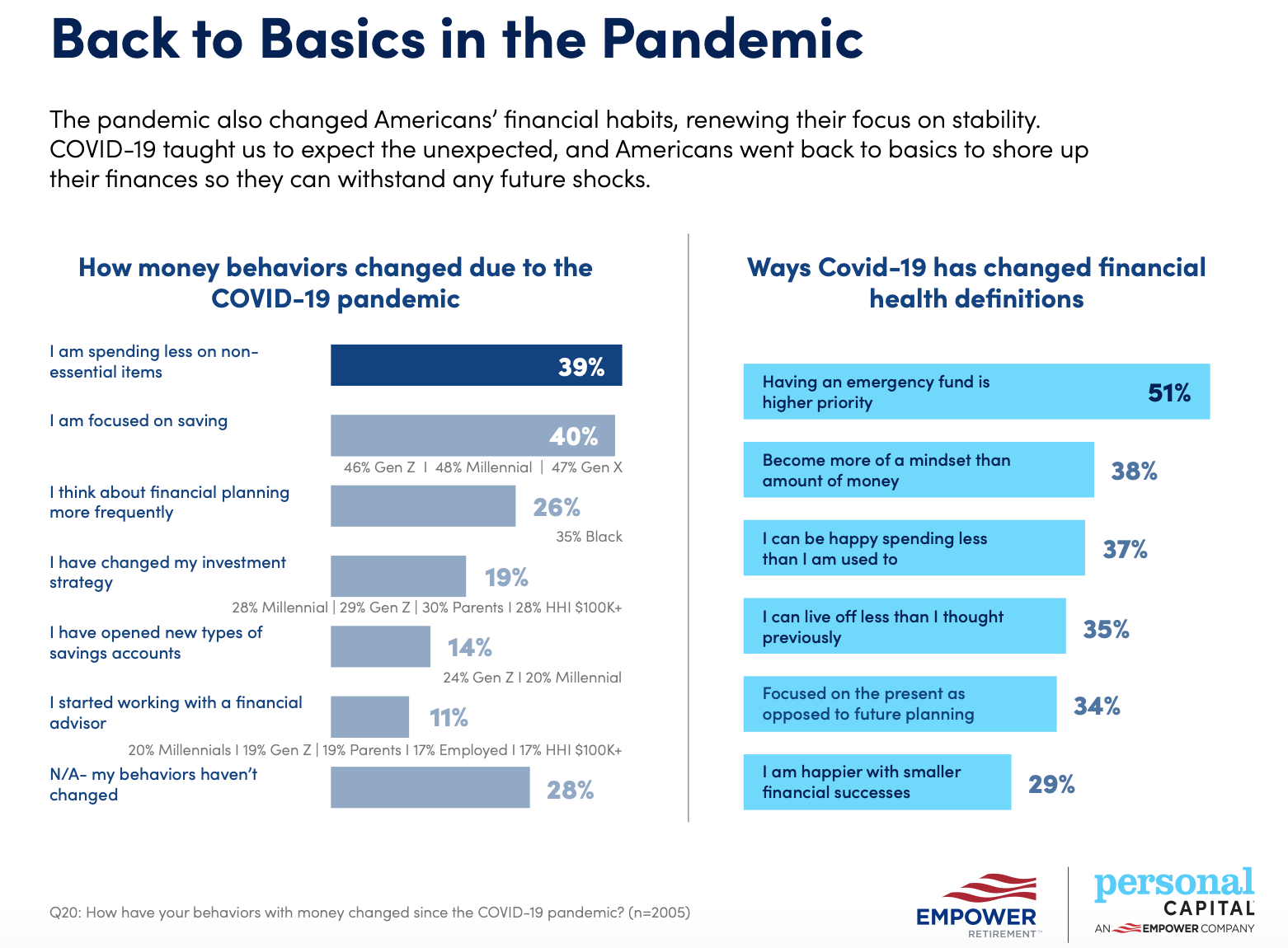
Takeaway: The days of impulse purchases may be gone as consumers remain cautious about their spending and look to build their savings because of the pandemic, but marketers can reach this new type of consumer by tapping into built-up demand for things such as experiences and travel that Americans are eager to get back to.
What Are Employers Looking For in New Hires?: Express Employment Professionals-Harris Poll
The pandemic has caused a disruption in the labor market, as we’ve highlighted in an earlier newsletter, but companies are still hiring. So what are hiring decision-makers considering when looking over applicants? Our study with Express Employment Professionals digs deeper:
- Eight in 10 (83%) U.S. hiring decision-makers look for willingness to learn in their applicants – a quality known as a soft skill.
- Other soft skills hiring decision-makers are looking for are dependability (82%) and communication skills (81%) – more traits that make employees easy to work with and can lead to successful relationships among team members.
- More than three-quarters say problem-solving skills (79%), adaptability (78%), or initiative (78%) are also of high importance.
- The focus on these attributes may in part be because more than half (57%) say their company had problems with low employee productivity during the pandemic compared to before.
Takeaway: Soft skills have always been important, but the pandemic reminded us of their importance and created more urgency for them. Express CEO Bill Stoller says “those who are dependable, flexible, communicate well and get along with others offer the full package for employers looking to add quality employees to their workforce.”
2020 Summer Olympics: An Outlook on Viewership and Brand Value
The 2020 Summer Olympics are upon us, and like all Olympics Games before them, they’re dominating the headlines. Recent numbers suggest viewership for the Tokyo Olympics have been underwhelming, but in polling we conducted earlier this summer, most Americans were poised to tune in. So what happened?
- A strong fan base undergirds the Olympic Games: even in the wake of controversy and COVID-19, (75%) of Americans feel that the Olympics are worth watching. We found three potential reasons that could explain the reduced actual viewership.
- Confusion around scheduling: As recently as June, (55%) of Millennials and (46%) of Gen Zers still weren’t aware that the 2020 Olympics had been rescheduled.
- Recent news coverage: A quarter of Americans (25%) report that they’re less likely to watch this year’s Games because of what they’ve seen in the news.
- Lack of live fans: A strong majority (75%) of Americans say a live audience is important to the experience of the Games – and the (lack of) atmosphere in empty stands likely impacted the appeal for some viewers.
- NBC’s streaming app Peacock has experienced a boost in both brand equity and momentum among consumers since the Games started – an early indication that NBC’s bet on the Olympics as a springboard for pulling ahead in the streaming wars may just pay off.
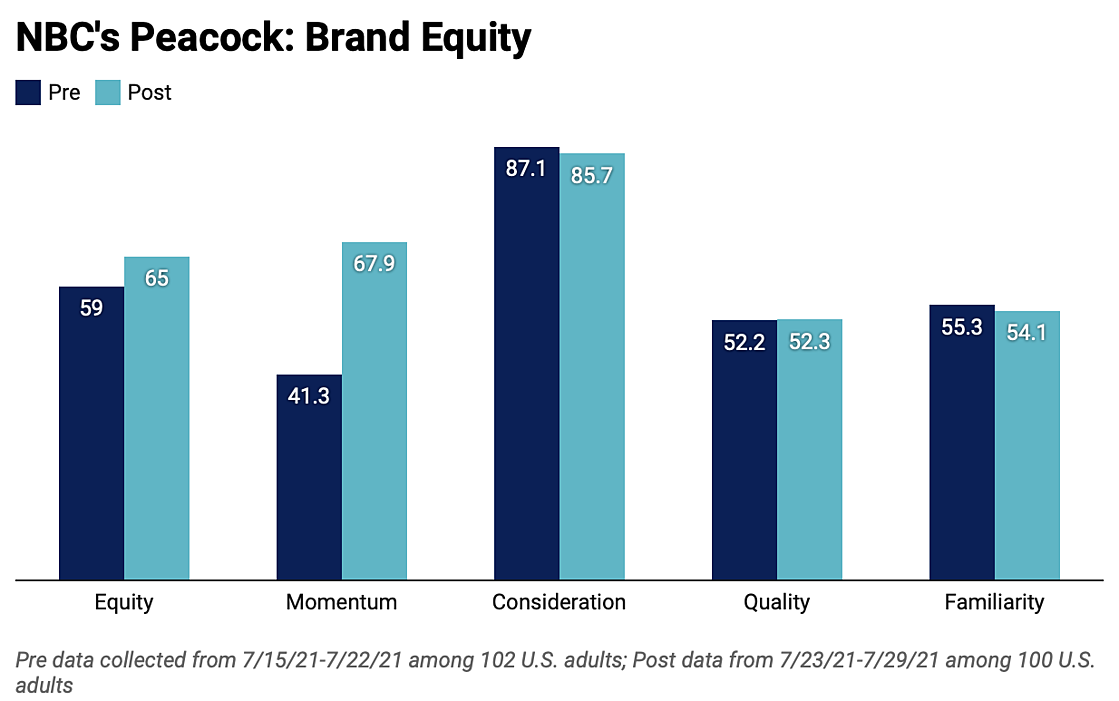
Takeaway: Decreased viewership could be bad news for brands as the Olympics are a major advertising event, with this year’s Games securing over $1 billion in ad spend among more than 120 advertisers. Yet less than half of Americans (46%) pay attention to which brands advertise during the Olympics. Stay tuned to see what our post-Games wrap up will discover about the advertising success of brands.
Subscribe for more Insights
Subscribe to our newsletter for the latest trends in business, politics, culture, and more.
Download the Data
This survey was conducted online within the U.S. by The Harris Poll from July 30 to August 1, among a nationally representative sample of 2,026 U.S. adults.
Download
Subscribe for more Insights
Subscribe to our newsletter for the latest trends in business, politics, culture, and more.
Download the Data
This survey was conducted online within the U.S. by The Harris Poll from July 30 to August 1, among a nationally representative sample of 2,026 U.S. adults.
DownloadRelated Content






